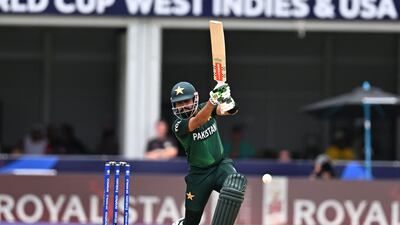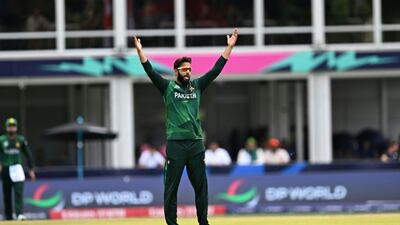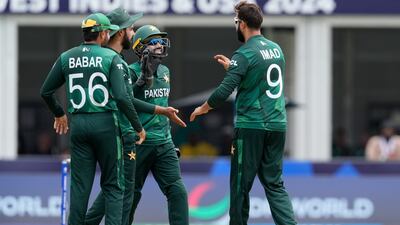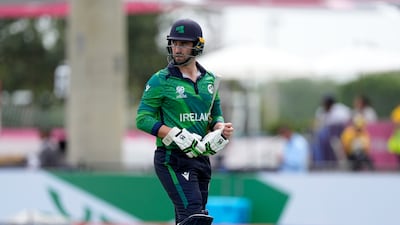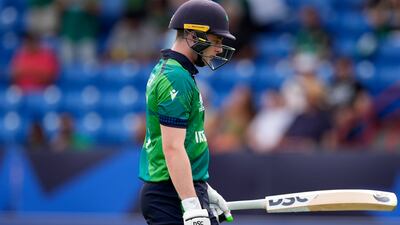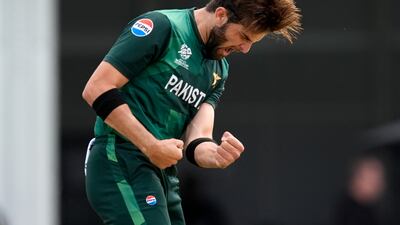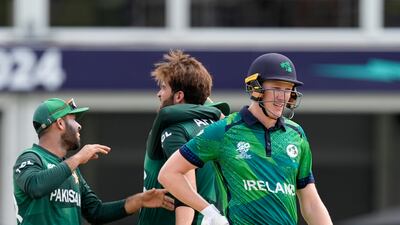After all the anger and bloodletting of Pakistan’s premature exit from the T20 World Cup, there was a hint of perspective. Maybe even a little sympathy.
“Team Pakistan, we love you but … get it together,” read one banner in the crowd at Broward County Stadium in Florida during their final pool match.
“It’s OK boys. We still love you,” read another, screened as they had just about muddled through to beat similarly hapless Ireland.
Whether they felt entirely loved is a different matter. The past couple of weeks have been miserable, and the recriminations are likely to be felt for some while yet, and will be in even sharper focus when they get back home.
Their three-wicket win over the Irish on the last day of pool play was their tournament in microcosm. There was the odd moment of individual excellence, particularly from bowlers who were trying to make up for the failings of their batters in advance.
There were further reminders from Mohammed Amir, who took two for 11 from four overs, and Imad Wasim, who took three for eight from his quota, about exactly what Pakistan had missed while they were retired. And enough noise around them, too, to make it understandable why they were happy to stay away.
There was a batting cameo from Shaheen Afridi. Enough for a highlights reel that would have attracted many admiring glances. Not least from himself.
Then there was the customary slapstick. Shaheen and Usman Khan collided in the outfield going for a catch, leaving both floored. Usman had to be treated for whiplash and a head injury, and missed much of the fielding innings.
And there was the standard hapless batting. Three batters were out heaving across the line on a pitch of variable bounce, while two others drilled poor deliveries straight to fielders.
It all felt like such a fitting end. What is it with Pakistan and tours to North America? It feels like they have never ended well, dating back to that time in 1997 when Inzamam-ul-Haq waded into the stands in Toronto to confront an India supporter who was baiting him with talk about potatoes.
In 2007 they lurched to perhaps the nadir of their own impressive list of calamitous tours when they crashed out of the 50-over World Cup in the West Indies.

It started out with the death, in harness, of coach Bob Woolmer in Jamaica. On the field, there was the loss to Ireland which was so damaging it had ramifications for the world game for the next two decades, not just Pakistan.
Because of that, and India’s simultaneous exit at the hands of Bangladesh, the structure of global events was overhauled. It has meant at least one fixture per tournament between India and Pakistan has become set in stone, rather than left to fate or meritocracy. And the emerging cricket world were excluded for years.
Now there is this tournament, where Pakistan have not even made it as far as playing matches in the Caribbean in a Caribbean World Cup.
Who is to blame? The targets have already been many and varied. Shoaib Malik, a former occasional Pakistan captain of middling success, reckons he would have resigned already had he overseen the campaign Babar Azam did. Of course he would. He might have thrown in a few retirements as well for good measure.
Babar himself reckons it's everyone’s fault. “This is not because of an individual as we lost as a team,” he said after the Ireland win. “It’s not just the captain. I cannot play for every player as there are 11 players.”
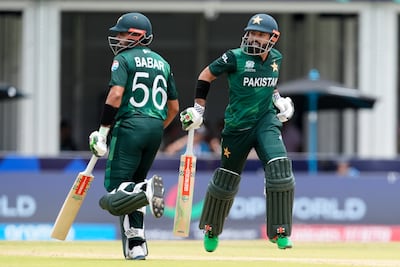
Fair. But then the captain is ultimately accountable for the performance of the whole.
Old hang-ups continue to linger. It is a tournament in which strike rates have been of minimal importance, seeing as it has mainly been played on wickets that could not resemble the roads of the Pakistan Super League any less. Undulating pitches require thinking cricket, which is where Pakistan fell down.
The “RizBar” axis of Babar and Mohammed Rizwan is still being spoken about as being too sedentary. In this tournament, Rizwan was scoring at 90.90 and Babar Azam at 101.66. Clearly, nowhere near their PSL peaks.
But they did not need to be. Take South Africa as an example. They made it through to the Super Eights by topping their group with four wins out of four. And yet not one of their players was striking at as much as a run a ball.
Quinton de Kock was hitting at 97.95, David Miller at 96.19, and Tristan Stubbs 82.95. They just found the right way to win, not by sticking to the macho brand of batting that they are more readily associated with. Pakistan, by contrast, found ways to lose.
Admittedly, they are being judged on just two defeats – the shock on opening day against the United States in Dallas, and the capitulation from a winning position in New York against India.
But even in the wins over Canada and Ireland they were unconvincing. As Shaheen said after picking up the player of the match award against Ireland, they are not playing the cricket their country demands.
There is always a lot of noise from outside the Pakistan team when they are struggling. But there are plenty of talking heads within the setup itself now, with Gary Kirsten newly in charge as coach, Babar as captain, Shaheen having had a taste of the same office, plus plenty of others besides.
Someone needs to be held accountable. With all that collective IQ, Pakistan should not be playing such mindless cricket as they showed at this World Cup.
